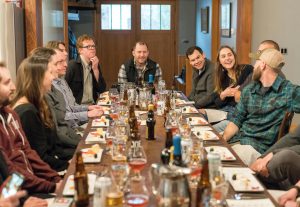St Andrew’s Milngavie 11th Sunday after Trinity 2025
Today we celebrated the 11th Sunday after Trinity accompanied by Alison.
Saturday 6th September – All Saints Cake Walk – Meet at 2pm in Church Car Park at Balfron, short walk to the Harrington’s house where tea will be served.
This Week
Tuesday 10am – Prayer Group in the Garden Room
Thursday 10am – Said Holy Communion followed by coffee in Friendship House.
Saturday 2pm – All Saints Cake Walk
Readings for next Sunday – 12th Sunday after Trinity – Deuteronomy 30:15-end Philomen 1-21 Luke 14:25-33
Today’s readings – Proverbs 25:6-7, Hebrews 13:1-8,15-16, Luke 14:1, 7-14
 In many circles food has become a major topic of conversation. There are many programmes on television centred on food and hospitality – books, magazines and social media all promote recent trends and fancies.
In many circles food has become a major topic of conversation. There are many programmes on television centred on food and hospitality – books, magazines and social media all promote recent trends and fancies.
But being essentially social beings hospitality is important to us. Significant anniversaries and celebrations often revolve around a meal enjoyed with friends and family, be it small intimate dos to large gatherings with elaborate seating plans, menus and decorations.
Jesus uses many contexts to set his teaching and ministry but perhaps one of his favourites is that of hospitality. This is most apparent in Luke’s gospel. There are more references to eating, banquets, and being at table in Luke than in any other gospel.
Today we find Jesus at table with a large group of people, and –as is his habit – Jesus is teaching while everyone eats. Jesus isn’t necessarily interested in the food being served, what he’s really interested in is the people at the table and especially their behaviour. Jesus was not simply planning a manners lesson for table etiquette here, he wanted to explain, once again, how different the rules are in the Kingdom of God.
As he watched the guests at this Pharisee’s house jockeying for good positions at the table, he saw a double teaching opportunity, and so, he took it.
First, he addressed the guests. He reminded them of the advice found in Proverbs: “Do not put yourself forward in the king’s presence or stand in the place of the great; for it is better to be told, “Come up here,” than to be put lower in the presence of a noble.” Prov 25:6-7
In those days, even as now on occasions, everyone had their place around the table, clearly the higher up you sat to the host the more prestigious the seat so there was often a scramble for the best seats. Jesus therefore encouraged them to aim low and then enjoy the attention of their host when they were invited to move up the table, and so avoiding any embarrassment of being asked to move down. Essentially this is a lesson in humility.
But we may like to think what humility means to us today. True humility is not feeling bad about yourself, or having a low opinion of yourself, or thinking of yourself as inferior to others. True humility actually frees us from preoccupation with ourselves, whereas a low self-opinion or esteem, which probably we can all suffer from time at times, tends to focus our attention on ourselves. True humility is about understanding ourselves. Viewing ourselves truthfully, with sober judgment, means seeing ourselves the way God sees us as the psalmist tells us in Psalm 139……
“O Lord, you have searched me and known me… you discern my thoughts from afar…..and are acquainted with all my ways…..”
Humble people make a realistic assessment of themselves without illusion or pretence to be something they are not. They regard themselves neither smaller nor larger than the truly are. True humility frees us to be ourselves and to avoid despair and pride.
And this is what Jesus is telling us here.
In the second part of the passage Jesus then turns to his host with more advice. And his words would have been a challenge to him, as they are to us.
In the cultural system of the first century one can imagine to secure one’s place in society, it was appropriate to invite friends, family, and neighbours, reciprocal requests would ensue. In other words, they networked, not unlike how we might do today. But Jesus calls into question this type of social engineering and as usual Jesus turns protocol on its head.
“Invite people who can never repay you” he says.
I don’t suppose he means inviting people simply because you feel sorry for them and wish to feel good about yourself.
I think he is simply trying to encourage us to be open to learning new things from unexpected people, to give pleasure to others and not seeking it for ourselves.
So, he tells us “But when you give a banquet invite the poor And you will be blessed because they cannot repay you for you will be paid at the resurrection of the righteous”
Every time we forge relationships, get to know new people, God’s love becomes tangible, and the kingdom of heaven moves a step or two closer to becoming a reality.
As affirmed in the letter to the Hebrews
“Keep on loving one another as brothers and sisters. Do not forget to show hospitality to strangers, for by so doing some people have shown hospitality to angels without knowing it.” Hebrews 13:1-2
Amen
